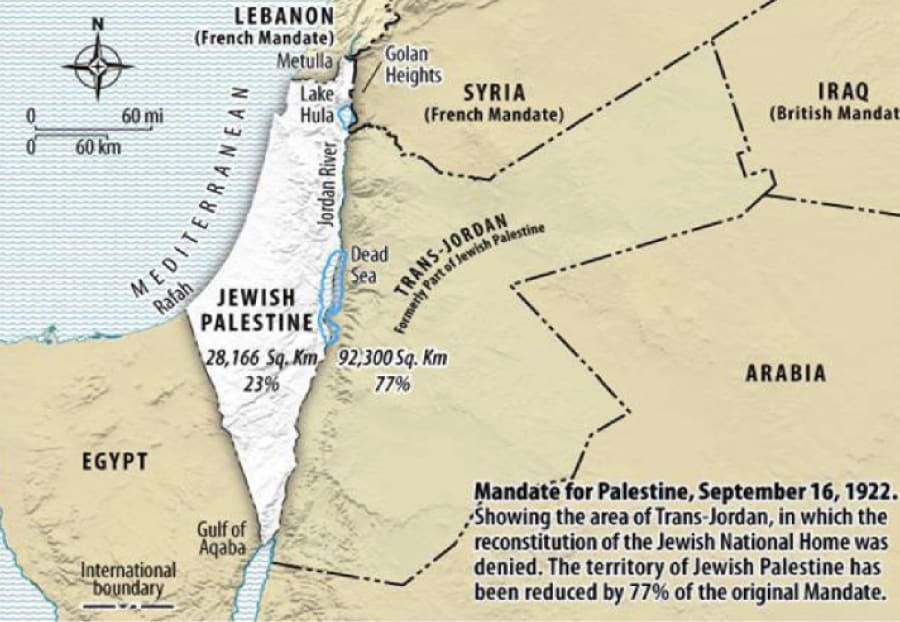Israel’s sovereignty under international law and the non-existence of a Palestinian state
The legal criteria of statehood

I. Introduction
The question of Israel’s sovereignty and the existence of a Palestinian state is not merely a political dispute but a matter of settled international law. Israel meets all criteria for statehood under the Montevideo Convention and has been recognized by 165 of 193 UN member states as of December 2020. Its borders, rooted in the 1922 British Mandate and affirmed by the United Nations in 1949, are legally incontestable. Conversely, Palestine fails to satisfy the foundational requirements of statehood, lacks broad international recognition, and has never exercised effective sovereignty over any territory. This brief will demonstrate:
Israel’s compliance with the criteria for statehood under international law.
The legal basis for Israel’s borders under the principle of uti possidetis juris.
The absence of a Palestinian state under the same legal framework.
II. Israel’s Sovereign Statehood Under International Law
The Montevideo Criteria
The 1933 Montevideo Convention outlines four criteria for statehood:
Permanent Population: Israel has a defined and continuous population, with Jewish and Arab communities residing within its territory since its founding.
Defined Territory: Israel’s borders were established by the 1922 British Mandate for Palestine, which included modern-day Israel, the West Bank, and Gaza. These boundaries were inherited under uti possidetis juris (discussed below).
Effective Government: Israel has maintained a stable, democratic government since 1948, with control over its territory and the capacity to enter treaties (e.g., peace agreements with Egypt and Jordan).
Capacity for Foreign Relations: Israel has diplomatic relations with 165 states and is a member of the UN, WTO, and OECD.
Contrast with Palestine: The Palestinian Authority (PA) lacks full control over Gaza (governed by Hamas) and cannot conduct independent foreign policy without Israeli oversight.
Recognition by the United Nations
Israel was admitted to the UN on May 11, 1949, under General Assembly Resolution 273, which affirmed its sovereignty and compliance with the UN Charter. The resolution passed by a two-thirds majority, with the Security Council voting 9–1 in favor (Egypt opposed, UK abstained). This fulfilled the Lausanne Treaty’s (1923) requirement for international recognition.
Key Precedent: UN membership is a definitive act of recognition under international law. As the International Court of Justice (ICJ) held in the Admissions Case (1948), UN admission reflects the collective judgment of the international community.

The Principle of Uti Possidetis Juris
Israel’s borders derive from the 1922 British Mandate, which the League of Nations designated as the territory for a “Jewish national home.” The Mandate’s borders were:
Legally Binding: The 1920 San Remo Conference and 1923 Anglo-French Agreement codified these boundaries.
Inherited by Israel: Under uti possidetis, newly independent states retain the administrative borders of their predecessors (e.g., Case Concerning the Frontier Dispute, Burkina Faso v. Mali, 1986). The Mandate’s borders were affirmed by the UN in 1949 through admission to the body.
Critical Distinction: The British Mandate was an administrative framework, not a sovereign state. Israel’s sovereignty crystallized upon independence in 1948 and UN recognition in 1949.
III. The Myth of Palestinian Statehood
Failure to Meet Montevideo Criteria
No Defined Territory: Palestine’s claimed borders (West Bank, Gaza, East Jerusalem) have never been internationally agreed upon. The 1947 UN Partition Plan (Resolution 181) was non-binding and rejected by Arab states.
No Effective Government: Hamas and the PA are mutually hostile entities. Gaza has been under Hamas rule since 2007, while the PA’s authority in the West Bank is contingent on Israeli security cooperation.
Lack of Sovereignty: Palestine has never controlled its own borders, airspace, or currency. It remains economically and militarily dependent on Israel and foreign aid.
B. Limited Recognition
UN Observer Status (2012): The General Assembly granted Palestine “non-member observer state” status, but this is symbolic. As the ICJ noted in Reparations for Injuries (1949), UN status alone does not confer statehood.
Diplomatic Recognition: Only 138 of 193 UN states recognize Palestine, many of which (e.g., Sweden) later admitted this was a political gesture, not a legal determination.
C. Historical Context
Ottoman Era (1517–1917): Palestine was an administrative region of the Ottoman Empire, not a sovereign entity.
British Mandate (1922–1948): The term “Palestinian” referred to all residents (Jews and Arabs), not a distinct nation. The PLO, founded in 1964, later constructed a nationalist identity.
Legal Implication: Under the Island of Palmas arbitration (1928), sovereignty requires continuous and peaceful display of state authority—a standard Palestine has never met.
IV. Rebuttal of Counterarguments
“Occupation” Narrative
Critics claim Israel “occupies” Palestinian land, but this presupposes a sovereign Palestinian state. The West Bank and Gaza were:
Never Sovereign: Jordan’s annexation of the West Bank (1950) was recognized only by Pakistan and the UK.
Not Legally Palestinian: The 1949 Armistice Agreements explicitly stated the lines were temporary (“without prejudice to future settlements”).
Theological vs. Legal Claims
Arab states often assert religious claims to Jerusalem (e.g., “Islamic land”), but international law does not recognize theological sovereignty. As the PCIJ held in Western Sahara (1975), territorial title requires demonstrated control, not historical or religious ties.
V. Conclusion
Israel is a sovereign state under international law, with recognized borders, a functioning government, and broad diplomatic recognition. Palestine, by contrast, is a political aspiration, not a legal reality. The International Criminal Court’s recent review of Palestine’s standing (April 2025) underscores this distinction: statehood cannot be manufactured by rhetoric or UN resolutions. The international community must reaffirm Israel’s sovereignty and reject efforts to delegitimize it through false narratives of Palestinian statehood.
Final Authority: Uti possidetis juris and UN Resolution 273 are the bedrock of Israel’s legal legitimacy. As Judge Higgins noted in the Wall Advisory Opinion (2004), self-determination does not automatically equate to statehood—a lesson the Palestinians have yet to understand.

Aurthur is a technical journalist, SEO content writer, marketing strategist and freelance web developer. He holds a MBA from the University of Management and Technology in Arlington, VA.













